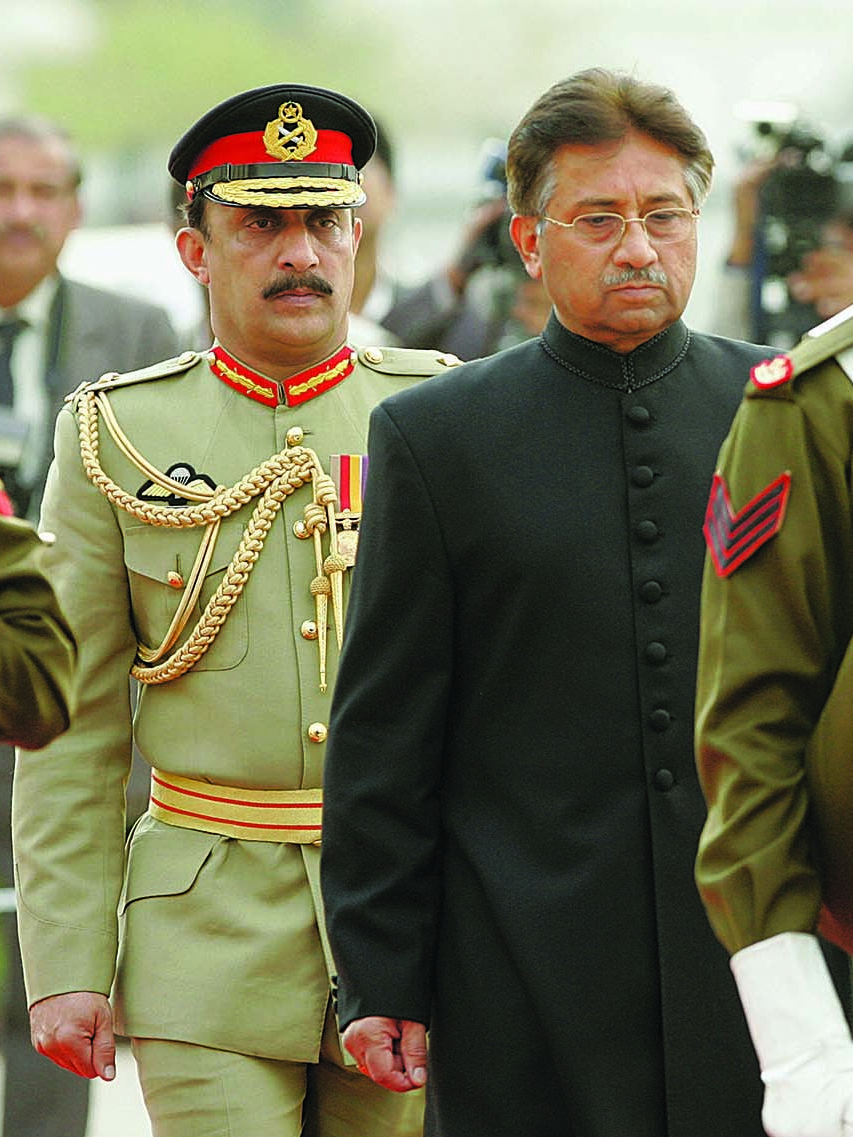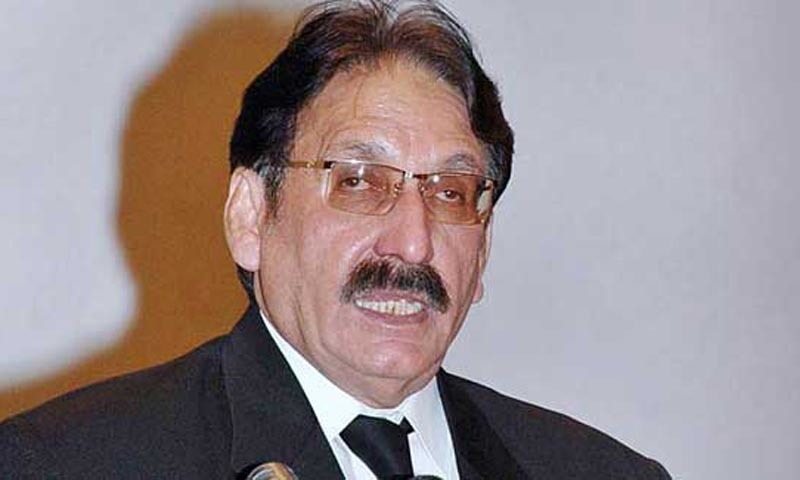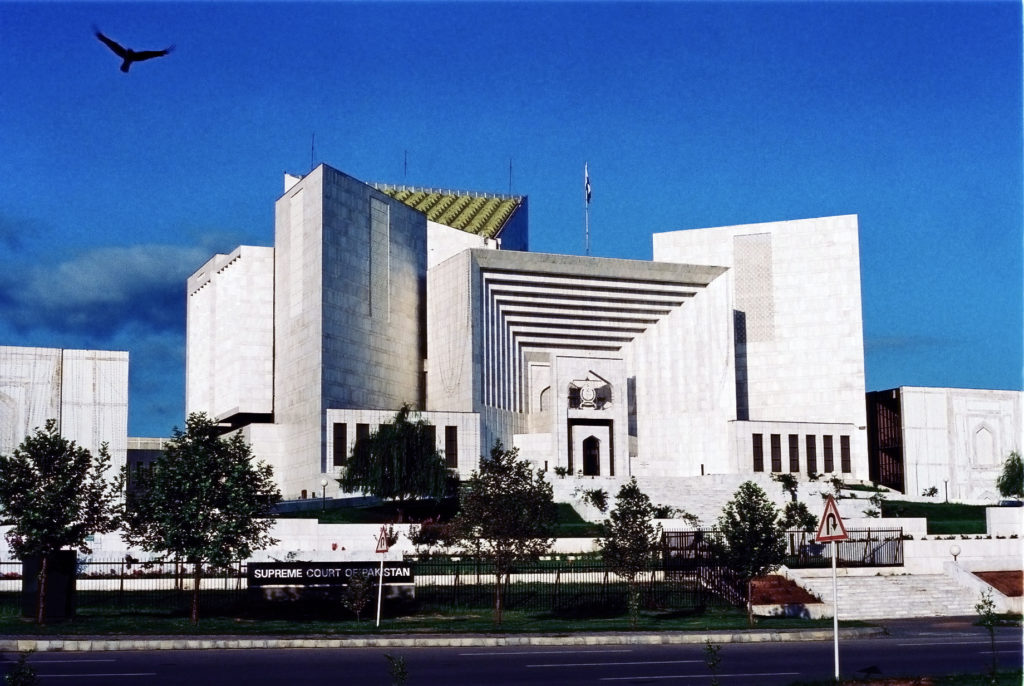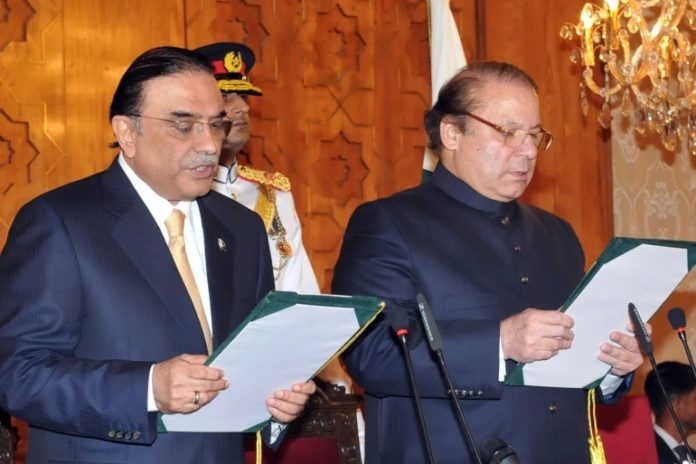“The establishments in the US, Pakistan and India are usually working for their
own good rather than for the good of their public. Shaking them might not be a bad idea”.
Former Director General of Inter Service Intelligence (ISI)
Lieutenant General (R) Asad Durrani quoted in Spy Chronicles
Pakistanis will be voting for general elections on 25 July 2018. Events of the last one year have raised many questions about the process. The gulf between important institutions is widening by the day. Attitudes have hardened and everyone is rallying behind their respective wagons. Pakistan’s power stool is three-legged and at one time known as ‘troika’. In the past, President, Prime Minister and Chief of Army of Staff were the three legs of this stool. Change of President to a ceremonial role by taking most of his powers removed this leg. In due course, this leg was replaced by Judiciary. The three legs are uneven with executive as shortest, followed in size by Judiciary and then army. There is an inherent element of instability in this arrangement.
Friction between civilian and military leaders is not new and there were problems between military leadership and Nawaz Sharif during his four years premiership (2013-17). There was deep mistrust therefore every move of the other party was viewed with suspicion. Each side claims that it compromised on many issues but other side was completely unreasonable and hence responsible for the mess. Institutional memories of real or alleged slights or intrigues are not easily forgotten and pile up with time. There are lot of rumors and whispers about military’s maneuvers behind the scene. Pakistan’s drawing rooms of upper class, chattering of middle class, toilers in bazaars and social media are awash with all kinds of innuendos, suspicions and highly polarized views. In general, there are two lines of arguments. Many Pakistanis including serving and retired officers are of the view that the rot has gone so deep that something needs to be done urgently. If some tinkering is done with the system to achieve desired results, there is no harm in it. The other side of the argument is that army’s involvement in political process is neither good for the politics nor for the army.
A third group thinks that nothing less than a radical transformation will work but not clear about how to do it? They need to face the plain fact that such measures are not achieved by tinkering with the system but complete dismantling of the existing one and replacement with a new one. This is done with a coup d’état. As general’s coup is status quo ante therefore such aim is achieved by a Colonel’s coup. No one has the stomach to even talk about this option. Almost all military men agree with what former DG ISI Lieutenant General (R) Asad Durrani told General Pervez Musharraf in August 1999 almost two months before the coup that “even banana republics nowadays have a façade of democracy”. Army views itself as a doctor that needs to administer medicine to the sick patient from time to time for the good of the patient even if he does not like the taste of the medicine. They expect that patient will thank them after recovery but have found that it is a thankless job.
I’ll review civil-military relations in the last two decades to provide a context for current scenario. There are only flickers of factual and concrete information and this is not unusual as when events are unfolding, key actors are not talking about their plans. It will be some time before key players will enlighten the nation what they did and their rationale for that course of action. It will not likely be much different than the movie we have seen before. See Exhibit: A. Versions of former Chief of Army Staff General Mirza Aslam Beg and former DG ISI Lieutenant General ® Asad Durrani about a similar exercise in 1990 and on the record frank admission of former Chief Justice late Nasim Hassan Shah about why judges look over their shoulders? Our opinions are based on a small amount of facts and an attempt to connect the dots. Perception is the key element in this exercise and I’ll focus on this element. I’ll simply state commonly known and uncontested facts and then dissect how they are perceived by different individuals and institutions. Each party has a one known set of facts but final opinion is not based exclusively on facts but perception about events unfolding around them. Decisions are made based on this mental set up.

Army’s role in domestic affairs is of various kinds and in some cases supported by public. It also depends on situation, domestic, regional and international environment and personality of army chief. On one end of the spectrum, when military is in direct control, it needs to co-opt politicians willing to work with the army. See Exhibit: A. General Pervez Musharraf’s rule 1999-2007. Army comes under criticism for this kind of role. On the other end of the spectrum, after disengagement from active rule with very low public opinion on its mind, military brass takes several steps back providing more room to politicians. See Exhibit: B. Brief periods in mid 1990s when army didn’t give ‘advice’ to Supreme Court and Nawaz Sharif government was restored and taking literally back seat during General Jahangir Karamat’s tenure (1996-1998). Army gets all the credit for this restraint and highest approval rating as it is viewed as a neutral institution. The grey area is when internal conflict crosses a certain red line where army feels it needs to do something. See Exhibit: C. Constitutional crisis of 1993 when President and Prime Minister locked horns paralyzing the country and General Abdul Waheed Kakar secured the resignation of both and ensured new elections. The other case is stepping in to tackle escalating political and criminal violence when political masters are not willing to fully support it. See Exhibit: D. Operation against criminal and militant elements of political parties in Karachi in 2016-17. Parties at the receiving end complain but public generally approves such limited and targeted role.
Eight years rule of General Musharraf saw political engineering at its worst. Politicians from Pakistan Muslim League (Nawaz) were weaned off and a new King’s party called Pakistan Muslim League (Quaid-e-Azam) was launched. On the other hand, dissidents from Pakistan People’s Party (PPP) were herded under a new umbrella named Pakistan People’s Party Parliamentarians-Patriots (PPPPP). Sindh’s urban based Muhajir Qaumi Movement (MQM – Altaf Group) was brought in the tent lock, stock and barrel. All this was achieved by incentive of limited partnership in enjoying the fruits of power and threat of prosecution under National Accountability Bureau (NAB) manned by serving and retired army officers. NAB was used as a laundry machine in such a hurry that many absurd situations were created. One example will suffice. PPP’s leaders Aftab Ahmad Khan Sherpao and Faisal Saleh Hayat were under investigation by NAB and their names on Exit Control List (ECL). Both were washed, cleaned and dried post haste and awarded cabinet posts (Sherpao first Water & Power and then Interior Minister and Hayat Kashmir Affairs Minister). Their names were still on ECL when they were sworn as federal ministers. Two NAB Chairmen, Lieutenant General ® S. M. Amjad and Lieutenant General ® Shahid Aziz strongly objected to using NAB as a laundromat and left.
What are the side effects of such exercises? Fracture of national political parties indirectly strengthens regional and ethnic parties. The most dangerous co-option with long term serious re-percussions was alliance with MQM-A. There was nothing wrong to ally with MQM-A for political convenience as done with other parties. However, no red lines were drawn resulting in revival of its militant wing with devastating consequences. Early 1990 operation against militant wing of MQM-A had severely degraded it. Now, it came back with vengeance. Dozens of serving and retired police officers who had participated in operations against MQM were assassinated plummeting the morale and efficiency of an already tattering Sindh police. MQM-A also went for its rival MQM- Haqiqi faction that was formed by army’s blessing in early1990s. Assassination campaign against Haqiqi leaders and workers caused another side effect. Many joined a religious group Sunni Tehreek to save their heads resulting in militarization of this religious outfit and worsening of sectarian conflict in Karachi. Several years later and under a new army Chief, Rangers had to clean the Karachi’s Augean Stables and many target killers of MQM-A were arrested. MQM-A dissidents formed a new party Pak Sarzamin Party (PSP). Fingers were again pointed to army as everyone who came under new umbrella was given a free pass with all past sins forgiven. The whole exercise seems walking in a circle where one finds himself at the same point he had crossed a while ago.
On 05 October 2007, under intense domestic and international pressure, General Musharraf signed a National Reconciliation Ordinance (NRO) that gave amnesty to bureaucrats and politicians facing corruption and even terrorism charges. Main reason was allowing Benazir Bhutto to return to Pakistan. Nawaz Sharif then in exile also barged in and the whole applecart was overturned. This paved the way for PPP winning 2008 elections. In 2007, with NRO, army Chief was planning to work with Benazir but after her death ended up with Asif Ali Zardari as President of the country. It should be a lesson that you cannot have staff college solutions for complex political problems.

Leaders should be held accountable and we have seen recent examples of political leaders removed from office and convicted on charges of corruption in several countries. In 2017, Supreme Court disqualified Prime Minister Nawaz Sharif for life for holding public office and currently hearing several cases involving his family members and government officials mainly from Punjab province that was until recently run by his brother Shahbaz Sharif. Current judicial zeal is also not new. It is re-run of Iftikhar Chaudhry court (2009-2016) with just a different party at the receiving end. Although fired and confined to his house by army Chief, Chaudhry knew his limits. PPP was not enthusiastic about his re-instatement but general sentiment in his favor was overwhelming and he was re-instated with the help of incoming army Chief. Chaudhry truly became a populist Chief justice came hard on PPP government. In 2009, Supreme Court struck down NRO with re-opening of all cases. This resulted in paralysis of the government. Interior Minister and Defence Minister were put on ECL. Later, PPP Prime Minister Yousaf Raza Gilani was disqualified on contempt of court charge. The most difficult and challenging task for court is to be seen by the public as a neutral arbiter.
Incompetence of politicians and weakness of political system is not in question. Partisan folks aside, many showing reservations about current process are not Nawaz Sharif sympathizers but taking a long view. Pakistan has achieved what is called ‘procedural democracy’ and in a pluralistic society it is not a mean achievement. A certain degree of legitimacy and consensus among political forces about rules of engagement are important first steps. Civil wars are usually the result of absence of this essential first step. However, only voting does not equate with a ‘participatory democracy’. Ownership by citizens, strengthening the instruments of accountability and equality before the law are building blocks of participatory democracy. This requires the mindset of marathon and not sprint.
Five years ago, there was a glimpse of what could have been a game changer for Pakistan. In 2013, Pakistan Tehreek-e-Insaaf (PTI) led by charismatic former cricket legend Imran Khan emerged as a viable third option. Genuine grass root participation from educated middle class, a relatively clean mid-level team with a charismatic leader emerged as a strong contender. PTI formed government in one province; Khyber-Pakhtunkhwa (KPK) and a robust opposition in the center. Off course it was not perfect but focus on KPK to implement the manifesto of the party, a vibrant opposition in center forcing electoral and judicial reforms, calling out executive on its acts of missions and commissions and working to expand party’s infrastructure to Sindh and Baluchistan as well as a functioning intra-party infrastructure of decision making. Most neutral observers that I talked to are of the view that even with twenty five percent work on all these areas and there was more than seventy percent chance that PTI would win center in 2018.
Judiciary has come a long way and public opinion has significantly improved as they view courts as protector against predators. Focus on eradication of corruption at lower courts, a careful and balanced check on executive, unbiased approach by taking all cases on merit bases and avoidance of publicity could have further enhanced the prestige of judiciary keeping it far away from controversy. Army already held in high esteem for its sacrifices in the fight against the menace of extremism. Army was given a very wide berth in dealing with this menace. Government and civil society never objected to even controversial operational decisions and fully supported it. Army’s focus on its professional role, helping in strengthening other institutions such as training and equipping of police forces, improving capacity of civilian partners such as political administration in tribal areas and staying clear of political land mines could have further enhanced its reputation.
Alas that road was not taken. Reinhold Niebuhr said that ‘the desire to gain an immediate selfish advantage always imperils their ultimate interests. If they recognize this fact, they usually recognize it too late’. In 2014, on prompting from then DG ISI, Imran Khan opted for the short cut and started a long protest movement alleging rigging in elections. It lost any interest in working in center as a viable opposition party. Many of us knew some of the details but now former Prime Minister Nawaz Sharif has claimed on the record that then DG ISI sent him a message to either resign or go on a long holiday. In Pakistani politics, it is normal that just before elections, many politicians change parties. Seeing the rising graph of PTI, many politicians joined the party. However, perception is that these politicians are prompted by the army. Now, even if PTI wins elections on its own merits there will always be a question mark that someone put his finger on the scale in its favor. Army’s reputation was sullied due to indiscretion of a handful of senior officers as army was seen playing favorites in political arena. There is clear and present danger of ‘mission creep’ as far as army is concerned. We are already seeing the signs. After disqualification of Nawaz, it was hoped that the balloon will be quickly deflated. His defiant tone and his party’s castle still standing was a worrisome sign. Quite message resulted in significant self-censorship in print and electronic media. Two defiant media houses came under intense pressure. One has already surrendered and other is fighting a rear-guard action. I fear more direct military involvement depending on threat perception. Judiciary starting on the right track quickly swerved away from its lane and in the process creating a perception that it is biased against one party. An impression was created as if judges are taking up cases after watching late night television or reading newspaper columns.
Now, to address these perceptions, they will try to correct the course and what could be those measures? If in power, to dispel the impression that he is no one’s boy, Imran may take some decisions that will put him on the war path with the army. If army sees its public image tarnished by these allegations, a new leadership will have no choice but to embark on a course correction. See Exhibit: E. In 2008, when it was seen that a recently de-throne political Chief was dragging the whole institution into the rabbit hole, institution under a new Chief choreographed his exit and a complete hands-off policy for 2008 elections.

Judges differ in their judgements on legal grounds. The perception of taking cases of political nature will inevitably result in division among judges on grounds other than legal. We are already seeing this in decisions of various courts. A new Chief Justice seeing the danger of fracture of court may decide to pull back completely. Now, in this course correction, court may even hesitate to take even genuine accountability cases. See Exhibit: F. Supreme Court in post Chaudhry era December 2013- December 2016. On the other hand, to show even handedness, a judge may decide to take a case against a senior army officer for a past transgression resulting in a rift between judiciary and army.
It is best to let unsavory political animals die a natural political death. Short circuiting the system only turns them into ghosts that haunt the nation. See Exhibit: G. Ghost of Bhutto was hanging over everyone’s head for decades. One five-years term for PPP and party was decimated by voters at the ballot box. Under Zardari’s stewardship, party has slumped to such a level that there are no takers of party tickets for upcoming elections. Many party sympathizers prefer to run as independent candidates as party has become highly radioactive under Zardari. Voters would do the same to Muslim League (Nawaz) if they think the party is not worthy of their trust. Accountability in a transparent and impartial manner to hold leaders responsible and then voters launching the coup de grace is the best way to clean the political stables. This will force the leaders to change their behavior if they want to stay in political field or risk being relegated to the dustbins of history. In 2008 and 2013 elections, many permanent fixtures of Pakistani politics were defeated at polls and knocked off the scene.
Short cut may give temporary reprieve but no long lasting positive results. Let’s review one case of recent short-circuiting process and its effects. Zardari was kept in jail for over a decade but not a solitary case was successfully prosecuted against him. He played the victim card and when internal and external compulsions forced a NRO, he excelled beyond even his own expectations and came out winner not as a king maker but king when he replaced Musharraf as President of Pakistan in 2008. Chaudhry’s Supreme Court burned down every protective hedge that Zardari erected and a new army Chief netted some close associates of Zardari and paraded them on television screens. It looked as if in a week and two, Zardari would be in the dock. Supreme Court under a different Chief Justice and army under a different Chief and Zardari is still standing tall and as one commentator called with his ‘Cheshire cat grin’. Some of my friends supportive of current strategy reassure me that it is a temporary respite and they have something more serious for Zardari. They are confident that they will put a noose around his neck in due time for crimes bigger than corruption. I have my doubts. Cooks have pulled out the same old recipe but it is causing a lot of mess in the kitchen. Even the narrative is exactly from the old script; only names changed. Nawaz is in the dock probably for the right reasons but the method is same amateur. He is getting traction only by playing the victim card. If we look at recent history then it is not far-fetched to imagine that a new Court and a new Chief in a changed domestic or international situation may decide to re-shuffle the deck. We may see a temporary truce with Nawaz to get Zardari and the game of musical chairs continues. The net result will be that both products (Nawaz and Zardari) will be still circulating in the market long after their expiration date.
In my view, short sighted actions by all key players may give some ‘instant gratification’ based on populist appeal but long-term consequences are negative for all institutions. Politicians see electoral victory as license to stay above the law ignoring all executive norms, running political parties like a seventeenth century Rajwara and using national treasury as personal privy purse. Many rather than fighting their battles at polling booths and in assemblies look at crutches. Such measures significantly undermine the public trust in the capability as well as intentions of politicians. This coupled with poor governance makes executive the weakest link in the chain.
It would have been far better in the long run that each institution did some introspection, strengthened its own foundations and worked on mechanisms of coordinated measures for general improvement in all areas. There is no nirvana in governance. It is an ongoing project of improving things. As far as institutions are concerned, there is never a perfect harmony but like marriage there is friction, difference of approach and opinion. The art is to manage these differences in a mature and responsible way so as not to make mockery of everything.
“I shall not allow the people to be taken back to the era of sham democracy, but to a true one. And I promise you I will, God wills it”. General Pervez Musharraf, 18 October 1999.
Acknowledgement
Author thanks many Pakistanis of diverse backgrounds including army officers for candidly sharing their views with me and in the process educating and enlightening me. All errors and omissions as well as conclusions are author’s sole responsibility.




